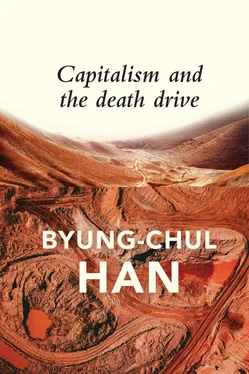From today’s perspective, the information requested by the census – profession, qualifications, how far one lives from one’s workplace – seem almost risibly innocuous. There was a time when people felt themselves to be confronting a state, a ruling institution, that was trying to wrest information from its citizens. That time has long since passed. Today, we expose ourselves voluntarily. It is precisely this felt freedom that makes protest impossible. Unlike those protesting against the census in the eighties, we do not significantly resist surveillance. Voluntary self-disclosure and self-exposure follow the same principle of efficiency as voluntary self-exploitation. Against what should we protest? Against ourselves? The American conceptual artist Jenny Holzer expresses this paradoxical situation in one of her ‘truisms’ thus: ‘Protect me from what I want.’
It is important to make a distinction between positing and preserving power. System-preserving power has now taken on a smart, friendly form, and it has thereby become invisible and unassailable. The subordinated subject is not even aware of its subordination. It believes itself to be free. This technology of rule is a highly efficient way of neutralizing resistance. Forms of rule that oppress people and undermine freedom are unstable. What makes the neoliberal regime so stable, so impervious to resistance, is that it makes use of freedom instead of suppressing it. Restricting freedom quickly provokes resistance. Exploiting freedom does not.
Following the financial crisis in Asia, South Korea was paralysed and in shock. Then the IMF came along and provided a bailout. In return, the government had to implement neoliberal reforms, and to use force against the resulting protests. This kind of oppressive power is positing power, and it often involves the use of force. But this positing power differs from system-preserving power, which, in the case of the neoliberal regime, presents itself as a form of freedom. According to Naomi Klein, the state of shock that societies like South Korea and Greece find themselves in after catastrophes such as the financial crisis are the perfect opportunity to forcibly subject these countries to radical reprogramming. In South Korea, there is no longer any real resistance to these measures. Instead, one finds high levels of conformism and consensus – together with depression and burnout. South Korea currently has the highest suicide rate in the world. Instead of seeking to change society, people use violence against themselves. The outward aggression that might have provided a basis for revolution has instead given way to auto-aggression.
There is no cooperative, networked multitude that could serve as a global protest movement and revolutionary body. Rather, the current form of production is based on the solitary, isolated, disconnected entrepreneur of the self. It used to be the case that, although enterprises competed with each other, there was solidarity within each enterprise. Today, everyone is in competition with everyone else, even within a single enterprise. This universal competition may lead to an enormous increase in productivity, but it destroys solidarity and the sense of community. You cannot form a revolutionary mass out of depressive, disconnected individuals.
Neoliberalism cannot be explained in Marxist terms. It does not even exhibit the famous ‘alienation’ from work. We throw ourselves enthusiastically into our work until we burn out. The enthusiasm is, in fact, the first stage of burnout. Burnout and revolution are mutually exclusive. It is therefore wrong to believe that the multitude will throw off the parasitic empire and establish a communist society.
What is the state of play regarding communism today? Everywhere there is talk of ‘sharing’ and ‘community’. The sharing economy is supposed to be replacing the economy of property and ownership. ‘Sharing is caring’: this is one of the maxims of the ‘circlers’ in Dave Eggers’s novel The Circle . The cobblestones on the way to the headquarters of the Circle company are interspersed with tiles bearing slogans such as ‘Find Community’ and ‘Participate’. But really the slogan should be ‘Caring is Killing’. The digital ridesharing platform WunderCar, which seeks to turn every one of us into a taxi driver, makes use of the idea of ‘community’ in its advertising. But the advent of the sharing economy does not herald the end of capitalism or the creation of a more communal global society in which sharing is valued above ownership, as Jeremy Rifkin claims in his book The Zero Marginal Cost Society . 1On the contrary, the sharing economy ultimately leads to the commercialization of all aspects of life.
The transition from ownership to ‘access’, which Rifkin celebrates, does not liberate us from capitalism. Whoever lacks money also lacks access to sharing. Even in the age of access, we are still living within the ‘ban-opticon’; those without money are still excluded. 2Airbnb, the community marketplace that encourages people to turn their homes into hotels, even economizes human hospitality. The ideology of community, or of a collaborative commons, leads to the total commodification of community. Simple, purposeless friendliness becomes impossible. In a society in which everyone rates everyone else, friendliness is commercialized. People become friendlier in order to receive better ratings. Even at the very heart of the collaborative economy, the relentless logic of capitalism still rules. Paradoxically, despite all this wonderful ‘sharing’, no one gives anything away. Once it begins to sell communism itself as a commodity, capitalism has reached its culmination. Communism as a commodity: that spells the end of any revolution.
1 1. Jeremy Rifkin, The Zero Marginal Cost Society: The Internet of Things, the Collaborative Commons, and the Eclipse of Capitalism, London: Palgrave Macmillan, 2014.
2 2. Transl. note: see e.g. Didier Bigo, ‘Globalized (in)Security: the Field and the Ban-opticon’, in Didier Bigo and Anastassia Tsoukala (eds), Terror, Insecurity and Liberty: Illiberal Practices of Liberal Regimes After 9/11, London: Routledge, 2008, pp. 10–48.
Конец ознакомительного фрагмента.
Текст предоставлен ООО «ЛитРес».
Прочитайте эту книгу целиком, купив полную легальную версию на ЛитРес.
Безопасно оплатить книгу можно банковской картой Visa, MasterCard, Maestro, со счета мобильного телефона, с платежного терминала, в салоне МТС или Связной, через PayPal, WebMoney, Яндекс.Деньги, QIWI Кошелек, бонусными картами или другим удобным Вам способом.












